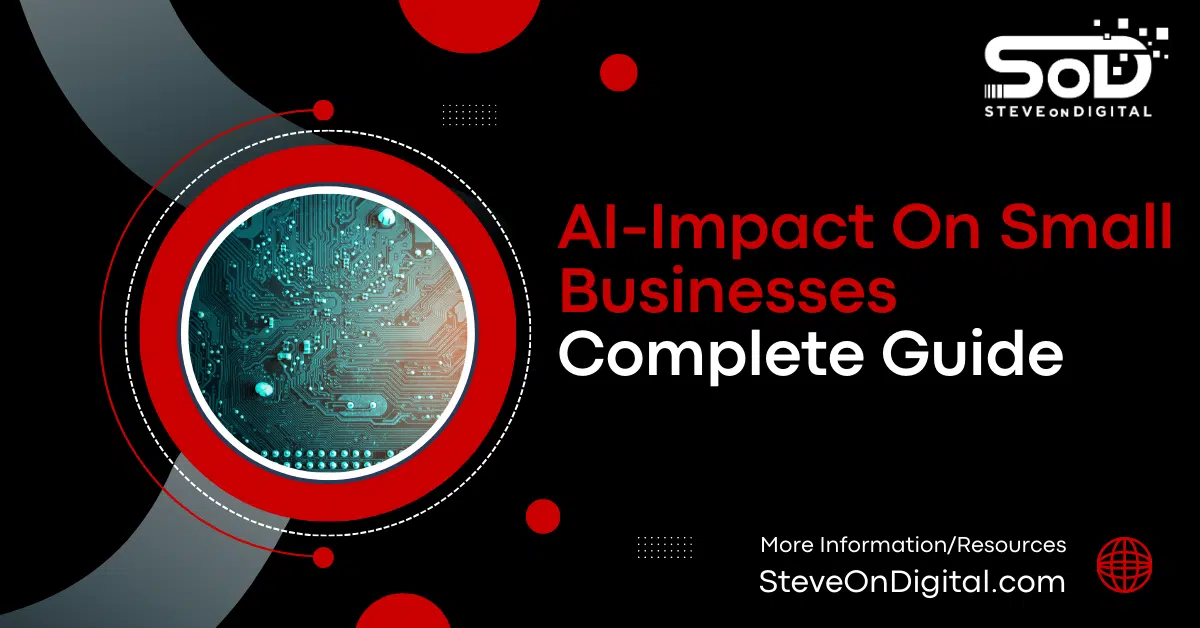Hello, I’m Steve Johnston, the owner and author of SteveOnDigital, and today I want to explore the profound impact of AI on small businesses.
As someone deeply entrenched in the digital transformation landscape, particularly for small and medium-sized enterprises (SMEs), I’ve witnessed firsthand how AI is reshaping the way we do business.
Impact Of AI On Small Businesses
Artificial Intelligence (AI) means machines that act smart like humans to do things and can get better by learning from what they see.
AI encompasses a range of tools including machine learning, where computers can be trained to recognize patterns and make decisions based on data.
The role of AI in modern business is expansive, influencing everything from data analysis to customer interactions and inventory management, with a variety of AI tools, including AI plug-ins and systems like ChatGPT, offering a spectrum of applications beneficial for small businesses.
Overview Of AI Tools And Technologies
For small businesses, AI technologies provide a competitive edge by offering valuable insights and automating repetitive tasks.
Common AI tools that are particularly beneficial include virtual assistants for handling customer inquiries, chatbots for enhancing the customer experience, and analytical tools that help in recognizing patterns in vast amounts of data quickly.
| AI Tool | Benefits for Small Businesses |
| Virtual Assistants | Handles customer inquiries efficiently, reducing wait times. |
| Chatbots | Enhances customer service by providing instant responses 24/7. |
| Analytical Tools | Quickly identifies patterns in large data sets for better decision-making. |
| AI Plug-ins | Integrates with existing software to improve functionality and automation. |
These tools are not just about technology—they represent a pivot towards more strategic, efficient operational models.
The Growing Importance Of AI
The adoption of AI by most small businesses has shown notable increases in efficiency and improvements in customer service.
AI systems help businesses manage their resources more effectively, ensuring they can focus on growth and innovation.
For instance, AI can analyze customer behavior patterns to provide personalized experiences, a crucial factor in building loyalty and satisfaction in today’s market.
Implementing AI For Business Operations And Strategic Growth
As we delve deeper into the applications of AI, it’s evident that small business owners can leverage this technology to dramatically enhance their operations and position themselves for significant growth.
Efficiency And Productivity Enhancement
Automation Of Repetitive Tasks Using AI Systems
‘One of the most immediate benefits of AI for small businesses is the automation of mundane, repetitive tasks.
AI software can handle activities like scheduling, data entry, and even certain aspects of customer service, freeing up human employees to focus on more complex and creatively demanding tasks.
This shift not only improves operational efficiency but also employee satisfaction.
| AI Application | Task Automated | Impact on Business Efficiency |
| Automated Scheduling Systems | Scheduling and data entry | Reduces manual labor and error rates, increasing operational speed. |
| AI Customer Service Platforms | Handling routine inquiries | Frees up staff for complex tasks, enhancing service quality. |
| AI Financial Tools | Generating financial reports | Automates analysis, speeding up decision-making processes. |
AI In Inventory Management
AI tools are particularly effective in inventory management, a critical area for many small businesses.
AI systems can predict stock needs based on trend analysis, helping businesses maintain optimal stock levels and streamline order processing.
This kind of efficiency in operations directly contributes to smoother business processes and reduced overhead costs.
Implementing AI For Faster And More Accurate Data Analysis
In the realm of data analysis, AI proves invaluable.
AI technologies can process vast amounts of data from various sources to derive actionable insights swiftly.
This capability allows small business owners to make informed decisions quickly, a decisive advantage in today’s fast-paced market environments.
The Strategic Adoption Of AI Technology
In the swiftly transforming landscape of modern commerce, artificial intelligence (AI) serves as a cornerstone for enabling small businesses to excel and adapt.
By integrating AI tools such as machine learning algorithms and virtual assistants, these enterprises can greatly enhance customer interactions and inventory management, leading to remarkable improvements in operational efficiency.
Such technologies are instrumental in allowing small business owners to analyze vast amounts of data quickly, offering valuable insights that drive business growth.
AI systems also facilitate enhanced employee training, ensuring that workforce skills align with evolving technological demands.
This strategic adoption of AI technology not only secures a competitive edge but also catalyzes sustained economic contributions by small businesses.
| Business Operation | AI Application | Expected Outcome |
| Inventory Management | Predictive stock needs analysis | Optimized stock levels, reduced costs |
| Customer Service | Personalized customer interaction | Increased customer loyalty and satisfaction |
| Data Analysis | Fast processing of large data sets | Quick and informed decision-making |
| Marketing | Targeted campaigns and content creation | Enhanced customer engagement and higher conversion rates |
Enhancing Customer Interactions And Experience
Role Of AI In Managing Customer Inquiries Through Virtual Assistants
AI-driven virtual assistants are revolutionizing the way small businesses handle customer inquiries.
These AI tools efficiently manage large volumes of inquiries without human intervention, ensuring that customers receive timely and accurate responses.
| AI Feature | Functionality | Customer Benefit |
| Personalized Marketing | Analyzing customer data for preferences | Tailors marketing messages, enhancing user engagement. |
| Proactive Service Bots | Predicting customer needs | Addresses needs proactively, increasing satisfaction. |
| Real-time Response Systems | Handling inquiries instantaneously | Improves response times dramatically, ensuring customer needs are met swiftly. |
My experience with AI in customer service highlights its ability to maintain high standards of customer interaction without significant resource expenditure.
Personalizing The Customer Experience With AI-Driven Insights
Further, AI’s ability to analyze customer interactions and feedback provides small businesses with the insights needed to tailor services and products to individual preferences.
This personalization is crucial for enhancing the customer experience and building stronger relationships with clients.
Utilizing AI Tools For Improved Customer Service And Engagement
Lastly, AI technology fosters enhanced customer service by predicting customer needs and offering proactive solutions.
For instance, AI can suggest additional purchases or remind customers about upcoming events, which enhances engagement and fosters a deeper connection between the business and its customers.
AI’s Transformational Impact On Marketing And Sales
As a digital transformation specialist, I have utilized AI extensively to refine marketing strategies and enhance sales processes for SMEs.

Here, I’ll share how AI can empower small business owners to excel in these critical business areas.
Leveraging AI For Targeted Marketing Campaigns And Content Creation
AI tools are revolutionizing the way businesses approach marketing by enabling highly targeted campaigns and dynamic content creation.
Here’s how I’ve leveraged AI:
- Data Analysis: AI excels in parsing through vast amounts of customer data to identify trends and preferences. This allows for highly personalized marketing that speaks directly to the customer’s needs and interests.
- Content Creation: AI-powered tools can help generate engaging content, from email marketing to social media posts, which resonates with the intended audience and drives engagement.
These AI-driven strategies not only increase the effectiveness of marketing campaigns but also significantly reduce the time and resources required for content creation and data analysis.
Using AI To Drive Sales Strategies And Achieve Business Growth
AI is not just about automating existing processes; it’s about innovating ways to drive business growth.
AI technologies have enabled small businesses to transform their sales strategies:
- Predictive Sales: AI systems can forecast customer behaviors and market trends, allowing businesses to proactively adjust their sales tactics and inventory to meet anticipated demand.
- Customer Interactions: Through AI, businesses can automate and customize interactions during key sales moments, ensuring a consistent and personalized customer experience that often leads to improved sales performance.
In my experience, these AI-driven approaches have not only streamlined operations but also created new growth opportunities by identifying and capitalizing on emerging market trends.
Gaining Competitive Advantage
One of the most significant advantages AI offers to small businesses is the ability to gain a competitive edge through enhanced customer insights and engagement:
- Customer Insights: AI tools analyze customer data quickly and with high accuracy, providing valuable insights that help businesses understand and anticipate customer needs better.
- Enhanced Engagement: AI-driven chatbots and virtual assistants have transformed how businesses manage customer inquiries and interactions, making them more efficient and effective.
These capabilities enable small businesses to compete on a larger scale, offering customer experiences and engagements previously only possible for larger corporations.
Financial Management Revolutionized By AI
Moving to the financial aspects of business management, AI’s impact is equally groundbreaking.
AI’s ability to enhance precision and efficiency in financial operations is transforming how small businesses manage their economics.
AI Applications In Financial Forecasting And Budgeting
AI has significantly improved the accuracy and efficiency of financial forecasting and budgeting for small businesses.
Here are a couple of ways how:
- Forecasting Accuracy: AI algorithms can predict future financial trends based on historical data, enabling businesses to plan more effectively.
- Budget Optimization: AI can identify unnecessary expenses and suggest areas where costs can be reduced without impacting business performance.
These tools have been instrumental in my consultations, helping small business owners plan their finances more confidently and with better foresight.
Enhancing Financial Accuracy
AI also plays a crucial role in improving the accuracy of financial records through automated bookkeeping and expense management:
- Automated Bookkeeping: AI software can automatically categorize expenses and revenues, significantly reducing the likelihood of human error.
- Expense Management: AI systems can analyze spending patterns and highlight areas where savings can be made, improving overall financial health.
These AI applications help ensure that financial records are accurate and up-to-date, providing business owners with a clear picture of their financial status at any given time.
AI And Risk Management
Lastly, AI’s predictive capabilities are crucial for risk management, identifying potential financial threats before they become problematic:
- Risk Identification: AI tools can detect unusual patterns that may indicate financial risks, such as fraud or unexpected cost overruns.
- Mitigating Strategies: Based on AI’s analysis, businesses can implement strategies to mitigate these risks proactively.
In my role, guiding SMEs through digital transformations has shown that AI not only safeguards against financial uncertainties but also empowers businesses to make more informed decisions, enhancing their stability and growth potential.
Workforce Management And Employee Development Through AI
As Steve Johnston, I’ve seen artificial intelligence dramatically transform workforce management and employee development.
Here, I’ll detail how AI is shaping these crucial aspects of business operations.
AI’s Role In Employee Training
AI technology plays a pivotal role in modernizing employee training and development.
By leveraging AI systems, businesses can create customized training programs that adapt to the learning pace and style of each employee.
Here are some specific ways AI contributes:
- Personalized Learning: AI algorithms assess individual performance and provide targeted training that focuses on areas needing improvement.
- On-Demand Training: AI-powered platforms offer training sessions on a flexible schedule, allowing employees to learn at their convenience without disrupting their work.
This approach not only boosts the efficiency of training but also significantly improves engagement and retention among employees.
Recruitment And Talent Acquisition
AI is also revolutionizing the recruitment process, making it faster and more efficient.
AI tools help in screening resumes and identifying the best candidates based on the skills and experience required for the role.
This process ensures that:
- Efficient Candidate Screening: AI quickly parses through vast amounts of applications, reducing the workload on human resources and speeding up the hiring process.
- Improved Matchmaking: Advanced algorithms assess candidate compatibility with company culture and job requirements, increasing the chances of successful hires.
These improvements lead to a more streamlined recruitment process, saving time and resources while finding the best talent for the business.
The Synergy Between Human Intelligence And AI In Creating More Efficient Workplaces
The combination of human intelligence and AI creates a powerful synergy that enhances workplace efficiency.
AI supports human workers by handling repetitive tasks and complex data analysis, allowing employees to focus on more strategic activities that require human insight.
This partnership:
- Enhances Decision-Making: With AI providing valuable insights from data, employees can make informed decisions quickly.
- Boosts Productivity: AI takes on time-consuming tasks, freeing up employees to concentrate on contributing to business growth and innovation.
Addressing Challenges And Security Concerns With AI Implementation
Implementing AI is not without its challenges, particularly concerning security and privacy, which are crucial considerations for every small business adopting new technology.
Understanding And Mitigating Data Privacy And Security Issues
Data privacy and security are paramount in the age of AI.

As AI systems often handle sensitive information, ensuring these systems are secure against breaches is essential.
Measures include:
- Regular Audits: Conducting regular security audits to identify and address vulnerabilities in AI systems.
- Data Encryption: Using advanced encryption methods to protect data accessed and generated by AI tools, safeguarding against unauthorized access.
By addressing these issues proactively, small businesses can maintain the trust of their customers and comply with data protection regulations.
| Challenge | Solution | Benefit |
| High Initial Costs | Scalable AI solutions | Minimizes upfront investment, grows with the business |
| Integration Complexities | Professional guidance and phased integration | Ensures smooth transition and optimal use of AI |
| Security and Privacy Concerns | Regular audits and advanced data encryption | Protects sensitive information, builds customer trust |
Cost And Integration Challenges Of AI Technology For Small Businesses
The cost of AI technology and its integration into existing systems can be daunting for small businesses.
However, the long-term benefits often outweigh these initial challenges.
To manage these aspects:
- Scalable Solutions: Opting for scalable AI solutions that can grow with the business and require minimal upfront investment.
- Professional Guidance: Seeking advice from experts in AI implementation to ensure smooth integration and maximum return on investment.
This strategic approach helps small businesses overcome the barriers to AI adoption, enabling them to compete more effectively in their markets.
Preparing For The Future
As AI continues to evolve, it will inevitably lead to changes in workforce dynamics and job roles.
Preparing for these changes is crucial:
- Future Skills Training: Providing training for employees to equip them with the skills needed for new roles created by AI advancements.
- Change Management: Implementing effective change management strategies to help employees transition into new ways of working with AI.
By preparing for these changes, small businesses can ensure their teams are ready and able to adapt, maintaining a competitive edge in a rapidly evolving market landscape.
AI’s Role In Cultivating A Resilient Small Business Ecosystem
Artificial Intelligence (AI) profoundly reshapes how small businesses operate, fostering a resilient ecosystem that is well-equipped to tackle future challenges.
AI technology continues to revolutionize traditional business models by automating repetitive tasks and refining problem-solving capabilities.
For small business owners planning to stay relevant in a digitized economy, leveraging AI tools is imperative for enhancing customer experience and scaling business operations efficiently.
The introduction of AI into daily operations helps businesses maximize resources, optimize security measures, and bolster data privacy.
These improvements are pivotal in maintaining robust customer trust and ensuring that small businesses not only survive but thrive in an increasingly competitive marketplace.
Strategic Planning For AI
As the owner and author of SteveOnDigital, I have always emphasized the importance of strategic planning in effectively integrating new technologies like AI into small businesses.
Here, I’ll share insights on crafting a strategy that not only incorporates AI seamlessly but also ensures it drives long-term business growth.
Developing A Comprehensive AI Strategy Tailored For Small Business Needs
Creating an AI strategy that aligns with the specific needs and capacities of a small business is crucial.
This involves several key steps:
- Identify Business Objectives: The first step is to define clear business goals that AI technology can help achieve. Whether it’s enhancing customer service, improving operational efficiency, or boosting sales, having a clear objective is vital.
- Assess AI Readiness: Evaluate your current infrastructure, workforce capability, and data systems to determine how ready your business is to adopt AI. This assessment will guide the necessary preparations for AI integration.
- Select the Right AI Tools: Not all AI tools suit every business. It’s essential to choose technologies that match your specific business processes and goals. This might involve custom AI solutions or adaptable off-the-shelf software.
Incorporating these steps ensures that the AI strategy is practical, achievable, and aligned with the overall vision of the business.
Building A Data-Driven Culture To Support Effective AI Adoption
AI systems thrive on data; hence, cultivating a data-driven culture is foundational for successful AI implementation.
This involves:
- Data Literacy: Educating your team about the importance of data and training them to use data effectively. This training should cover data collection, analysis, and decision-making processes.
- Quality Data Systems: Implementing robust systems to collect, store, and manage data. Ensuring data quality and accessibility is crucial for AI systems to function optimally.
- Encourage Data-Driven Decision Making: Foster an environment where decisions are made based on analytical insights rather than intuition. This shift is crucial for maximizing the benefits of AI.
These initiatives help small businesses not only prepare for AI but also enhance their overall analytical capabilities.
Staying Informed About AI Developments And Future Trends
The field of AI is rapidly evolving.
Staying updated with the latest developments and trends is essential to maintain a competitive edge:
- Continuous Learning: Engage in ongoing learning and training opportunities related to AI and emerging technologies. This could include attending workshops, webinars, and industry conferences.
- Networking: Connect with experts and peers in the AI community to exchange knowledge and experiences. This network can provide valuable insights and support as you navigate the complexities of AI adoption.
- Research and Development: Invest in research to explore new AI advancements that could benefit your business. This proactive approach can open up new opportunities for innovation and growth.
Real-World Success Stories And Case Studies
Nothing illustrates the impact of AI on small businesses better than real-world examples and testimonials from those who have experienced these benefits first-hand.
Examples Of Small Businesses That Have Successfully Implemented AI
- Retail: A small online retailer implemented AI-driven chatbots to handle customer inquiries, significantly reducing response times and increasing customer satisfaction rates.
- Manufacturing: A small manufacturing company uses AI to optimize its supply chain and inventory management, reducing costs and improving production efficiency.
These examples show how AI can be a game changer for smaller enterprises with limited resources.
Testimonials And Insights From Business Owners About The Benefits Of AI
Many small business owners I’ve worked with have shared positive outcomes from AI integration:
- Increased Efficiency: Business owners often report that AI tools have streamlined operations, allowing them to do more with less and focus on strategic tasks.
- Enhanced Customer Experience: AI’s ability to analyze data quickly and recognize patterns has enabled businesses to offer personalized services, improving customer engagement and loyalty.
These insights from fellow small business owners not only underscore the tangible benefits of AI but also inspire others to consider how AI might transform their operations.
Looking Ahead
As the owner and author of SteveOnDigital, I’ve closely monitored how artificial intelligence (AI) has begun to influence small businesses and the broader industry landscape.
Looking to the future, the potential for AI to further transform small business operations is immense.

Let’s explore some of the upcoming AI technologies and how they are predicted to shape small business strategies and operations.
Upcoming AI Technologies That Could Further Transform Small Businesses
- Advanced Predictive Analytics: AI is set to enhance its capability in predictive analytics, providing small businesses with even more accurate forecasts of sales trends, customer behavior, and market conditions. This will allow for more precise business planning and resource allocation.
- AI-Enhanced Automation: Future developments in AI will bring smarter automation tools that can handle more complex tasks across different aspects of business, from accounting to customer service, improving efficiency and reducing costs.
- AI-Powered Cybersecurity Solutions: As cybersecurity threats evolve, AI technologies are expected to become more sophisticated in detecting and mitigating potential security breaches, crucial for protecting sensitive data and maintaining customer trust.
These innovations will not only streamline operations but also open new avenues for growth and service enhancement.
Predictions On How AI Will Continue To Influence Small Business Strategies And Operations
- Customization and Personalization: AI will enable small businesses to offer highly customized products and personalized services at scale, providing a competitive edge in attracting and retaining customers.
- Employee Skill Enhancement: AI-driven training tools will become more refined, helping small businesses develop their workforce more effectively and ensuring employees are well-prepared for the evolving work environment.
- Operational Agility: With AI’s ability to analyze data quickly and accurately, small businesses will become more agile, able to respond rapidly to market changes and customer needs with innovative solutions.
| AI Development | Description | Expected Impact on Small Businesses |
| Advanced Predictive Analytics | Enhancing data analysis capabilities | Enhances accuracy in sales and market trend predictions. |
| AI-Enhanced Automation | Increasing automation scope | Broadens the scope of tasks that can be automated, reducing costs and improving quality. |
| AI-Powered Cybersecurity Solutions | Strengthening cyber defenses | Protects business data and customer privacy, reinforcing trust. |
Conclusion
Reflecting on the transformative impact of AI on small businesses, it’s clear that the integration of AI technologies offers numerous benefits that can drive significant business success.
Recap
- Increased Efficiency and Productivity: AI automates routine tasks, freeing up time for employees to focus on higher-value activities. This not only boosts productivity but also enhances employee satisfaction by removing monotonous tasks.
- Enhanced Customer Experiences: Through tools like virtual assistants and personalized marketing, AI helps small businesses understand and serve their customers better, leading to increased loyalty and sales.
- Informed Decision Making: AI’s powerful data analysis capabilities provide valuable insights that help small businesses make more informed decisions, reducing risks and identifying new opportunities.
The potential for AI to revolutionize small business operations is vast and continuing to evolve.
As AI technologies advance, they will bring even more opportunities for small businesses to improve their efficiency, enhance their services, and remain competitive in a fast-paced market.
Encouraging Small Business Owners
To my fellow small business owners, the message is clear: embracing AI is not just about keeping up with technology—it’s about setting your business up for future success.
The implementation of AI offers a pathway to enhanced competitiveness and innovation.
By staying informed about AI developments, investing in suitable AI tools, and fostering a culture that embraces digital transformation, small businesses can leverage AI to not only survive but thrive in the digital era.
As we continue to navigate this exciting technological landscape, the role of AI in small business will undoubtedly grow, offering new tools and opportunities for businesses ready to take the leap.
Embrace AI, and let it propel your business to new heights of success and innovation.




